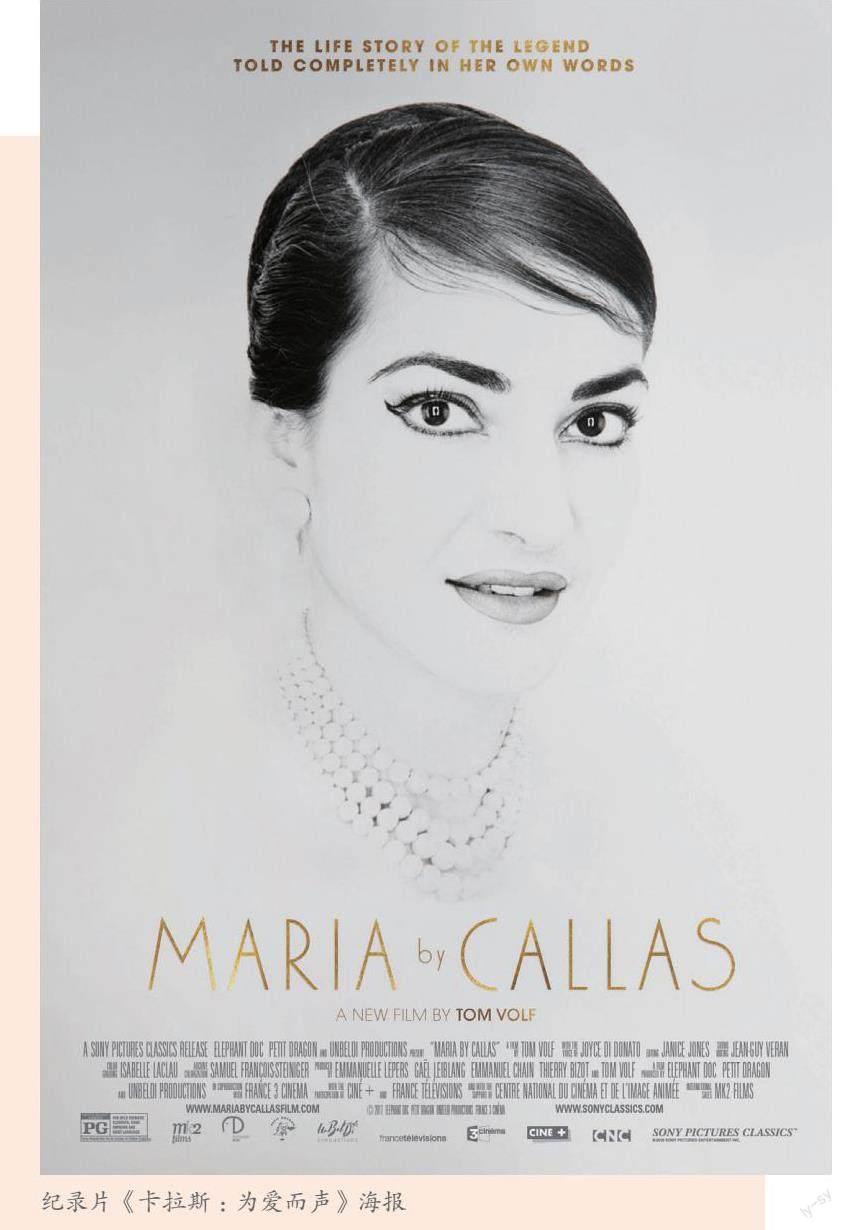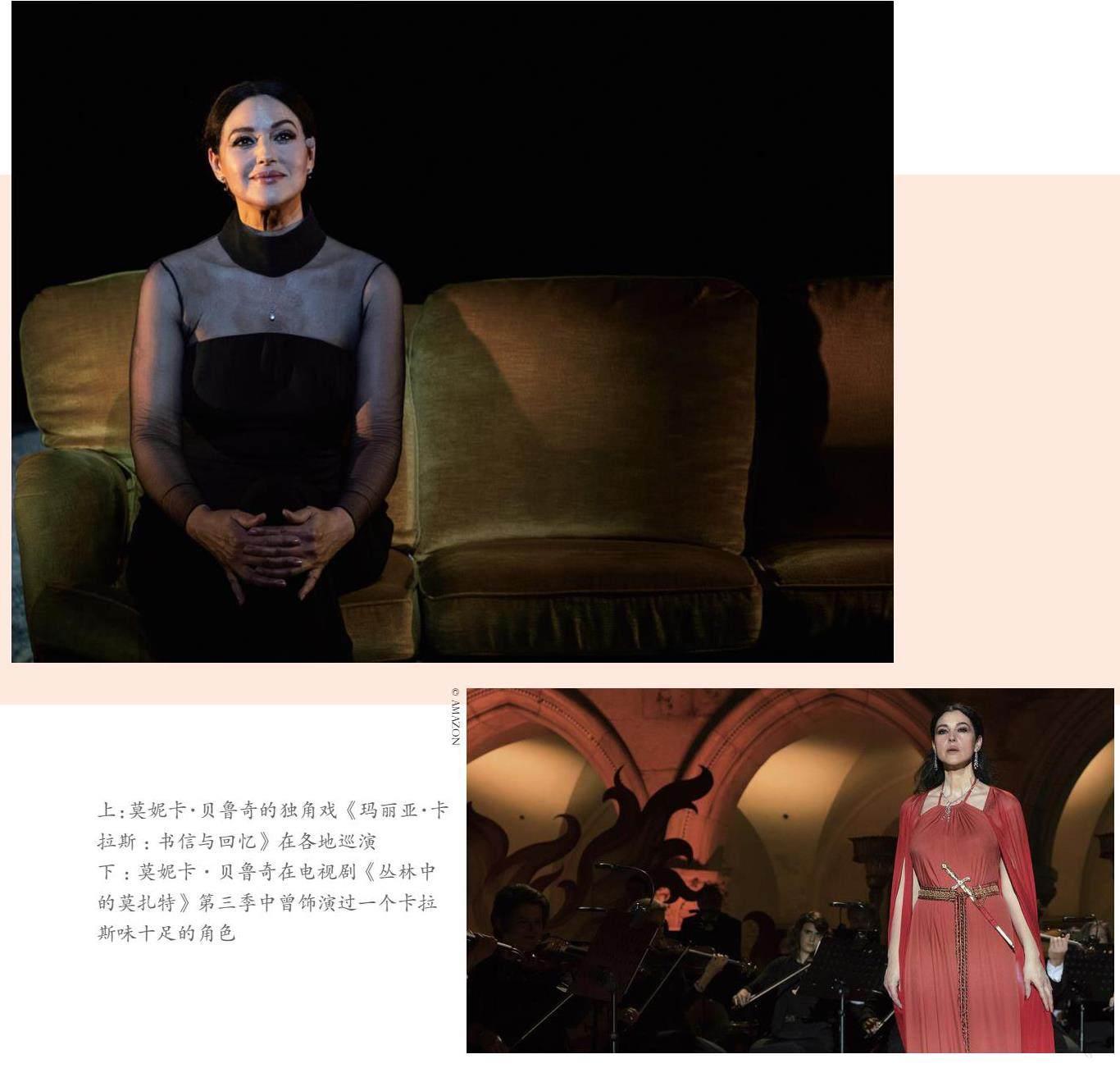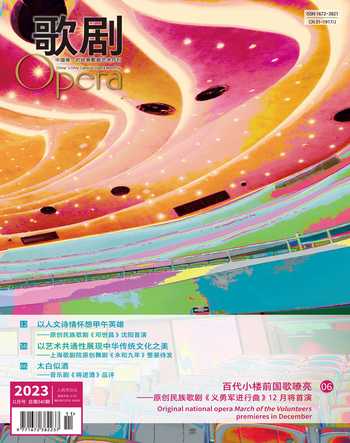最美丽的声音:说不尽的“玛丽亚”
司马勤



打头阵的是玛丽娜· 阿布拉莫维奇(Marina Abramovic),接着是莫妮卡· 贝鲁奇(Monica Bellucci),最近的一位是安吉丽娜· 朱莉(Angelina Jolie)。其实,要是你真的深层挖掘历史,在此之前还有佐伊· 考德威尔(Zoe Caldwell)、帕蒂· 卢波恩(Patti Lupone)、迪克西· 卡特(Dixie Carter)、泰恩· 戴利(Tyne Daly)、芬妮· 阿尔丹(Fanny Ardant)、费伊· 唐纳薇(Faye Dunaway)……以及很多很多——但她们都属于久远的20 世纪90 年代, 且仅出演过个别场次,暂且忽略不计。
唯一能将上述各式各样的舞台及银幕上女星归结在一起并产生交集的,是她们都曾扮演过玛丽亚· 卡拉斯(Maria Callas)——这位毫无争议的20 世纪地位最崇高的歌剧女伶。尽管她于1977 年去世,享年只有53 岁,时至今日这位女高音在歌坛的影响力仍然举足轻重。虽说她的百岁冥诞(12 月2 日)即将到来,她死后有关她的艺术创作却丝毫没有放缓的迹象。
20 世纪90 年代,美国剧作家特伦斯· 麦克纳利(Terrence McNally)可谓是追捧卡拉斯的开荒牛, 风头一时无两。他最初于1989 年创作的戏剧《里斯本茶花女》(The Lisbon Traviata ),剧中人都是歌剧铁粉,卡拉斯自然就成为台上的热门话题。后来,他在《大师班》(Master Class )里塑造的女主角就是卡拉斯——在故事中,她一边为年轻的声乐学生授课,一边经历着自己人生的大起大落——那些最光辉的时刻以及最坎坷的日子,在倒叙中喷涌而出。《大师班》是不是一部伟大的话剧,定论不一。但是, 业界公认这是众多女演员所梦寐以求的、毕生最渴望担纲的角色。起码有十多位女演员——如果算上戏剧工作坊的话,可能会高达几百位——曾有机会身临其境地在戏剧氛围下“活”在卡拉斯的“躯壳”里。
令人惋惜的是,30 年前的麦克纳利虽然占得先机,但他却没有等到卡拉斯百年诞辰演出季的来临。这位剧作家于2020 年因新冠肺炎并发症而去世。若麦克纳利还活着,今天的他必定欣喜若狂,因为可以见证卡拉斯的艺术传承在全球范围开花结果。
2018 年,一轮新的展现卡拉斯风采的项目开始登上舞台——你可把它们称为“与先人的合作” (necrollaborations)。带头的是《在音乐会里的卡拉斯》(Callas in Concert ),“现场”投影了卡拉斯的三维全息影像来演绎歌剧曲目(这种手法也曾用于迈克尔· 杰克逊和罗伊· 奥比森等已故流行歌手的音乐会)。同一年又出现了《卡拉斯:为爱而声》(Maria by Callas ),这部纪录片是摄影师兼导演汤姆· 沃尔夫(Tom Volf)的作品。他收集并剪辑了大量已被遗忘的历史影音片段并为它们重新着色, 制作出来的影片的高清视觉体验令人赏心悦目。
而“行为艺术之母”玛丽娜· 阿布拉莫维奇将舞台与银幕艺术结合起来的《玛丽亚· 卡拉斯的七次死亡》(7 Deaths of Maria Callas)更耐人寻味。《纽约时报》称之为“一部分混合录音带、一部分是降神会”。《七次死亡》的联合委约方包括巴伐利亚国家歌剧院、希腊国家歌剧院、德国歌剧院、巴黎歌剧院与那不勒斯圣卡洛歌剧院(这个制作本月刚好在英国国家歌剧院巡演),作品时长90 分钟。阿布拉莫维奇在该剧中重新塑造了卡拉斯在舞台上最标志性的死亡场景(以及卡拉斯去世时的情景)。每一部歌剧的咏叹调(威尔第的《茶花女》与《奥赛罗》、普契尼的《托斯卡》与《蝴蝶夫人》、比才的《卡门》、多尼采蒂的《拉美摩爾的露契亚》、贝利尼的《诺尔玛》)都请来了歌唱家现场演唱,并且同步放映7 部短片,主演正是阿布拉莫维奇与威廉· 达福(Willem Dafoe)。
相比之下,莫妮卡· 贝鲁奇在各地巡演的独角戏《玛丽亚· 卡拉斯:书信与回忆》(Maria Callas: Letters & Memoirs)就简单得多:她只需要诵读这位女高音曾经写下的篇章即可。最令人热议的是编剧与导演——又是汤姆· 沃尔夫——竟然说服了这位电影明星把卡拉斯的精神呈现在舞台上(贝鲁奇穿的是从私人收藏家借过来的一条卡拉斯曾穿过的圣罗兰小黑裙);不过,我们中的一些人确实记得,贝鲁奇在电视剧《丛林中的莫扎特》(Mozart in the Jungle )第三季中曾饰演过一个卡拉斯味十足的角色。
如果我们真的要比较的话,智利导演帕布罗·拉雷恩(Pablo Larraín)的新电影《玛丽亚》(Maria )即将进入立项宣传期,这项大新闻将此前的卡拉斯项目彻底比了下去,让它们仅沦为纪念活动的序幕罢了。帕布罗·拉雷恩的早期作品包括聚焦杰奎琳·肯尼迪的《第一夫人》(Jackie )与戴安娜王妃的《斯宾塞》(Spencer )。这部由安吉丽娜·朱莉主演的《玛丽亚》,将全方位探视这位歌唱家的职业生涯与私人生活,编剧史蒂芬· 奈特(Steve Knight)在好莱坞编剧罢工潮之前就完成了剧本。
***
《玛丽亚》定于今年12 月初开拍,以纪念卡拉斯一百周年诞辰;我们还不知道电影正式上映的日期。不过,与此同时,“伦纳德· 伯恩斯坦”已经在台侧“候场”——他早准备好了。
影片《大师》(Maestro )讲述美国这位最负盛名的音乐巨匠的一生,于9 月在威尼斯电影节首映,随后亮相各大国际电影节。电影将于11 月底在影院限量发行(limited theatre release),并将于年末的圣诞新年假期登陆网飞(Netflix)进行全流媒体播放。这部电影是布莱德利· 库珀(Bradley Cooper)在疫情期间专注的项目,他一人身兼数职:参与编剧——另一位编剧是奥斯卡得主约书· 辛格(Josh Singer)、负责导演、担任主角。曾经参与过《大师》但后来退出的幕后推手都是响当当的大腕:首先构思这部电影的是马丁· 斯科塞斯(Martin Scorsese);史蒂文· 斯皮尔伯格(Steven Spielberg),继2021 年重新拍摄《西区故事》后, 有意拍摄一部关于伯恩斯坦生平的故事片。斯皮尔伯格甚至已经接洽了库珀来担纲男主角,直至看过库帕自导自演的《一个明星的诞生》(A Star is Born ) 后,斯皮尔伯格把导演一职也交了给库帕。(斯科塞斯与斯皮尔伯格两人仍然是《大师》的监制。)
有趣的是,跟卡拉斯一樣,伯恩斯坦同样吸引了不少聚焦他传奇一生的项目,而大多数都在伯恩斯坦诞生百周年(2018 年)时期出现的。《大师》甚至不是唯一一部正在制作中的好莱坞故事片:杰克· 吉伦哈尔(Jake Gyllenhaal)在差不多同一时期策划了另一套伯恩斯坦电影。但因为某种原因—— 可能是觉得同步发行两部好莱坞电影会削减它们的影响力——伯恩斯坦家族决定支持库帕。在过去几年里,无论是卡内基音乐厅或腾格乌尔德的观众们, 会在不知不觉中有机会碰上低调的库帕与他的助理在现场收集资料,或撰写笔记。
到目前为止,伯恩斯坦家族的选择显得很明智。尽管《大师》至今只在电影节以及一些私人场合放映过,但效果很好并受到观众追捧——这些观众不限于古典音乐爱好者。评论家赞扬电影表现出伯恩斯坦心中备受折磨的复杂情绪——重心应该是在作曲还是担任指挥,抑或是如何取舍家庭生活和性取向问题?——饰演费利西亚· 蒙特阿里格勒(Felicia Montealegre,即伯恩斯坦夫人,她自身也是舞台及电视演员)的英国明星凯莉· 墨里根(Carey Mulligan)演技精湛——在现实生活里,蒙特阿里格勒早已知道未婚夫不为人知的那一面。
当影片大范围的发行后,大概一劳永逸地解决关于演员化妆修补学的争议。库帕和《大师》这部电影都因他那提高了的面部造型而备受抨击——早期的宣传照显示了库帕配上了一个酷似伯恩斯坦的大鼻子。在当前美国身份政治敏感的氛围中,“犹太脸”的呼声和对非犹太裔的库帕没有资格扮演伯恩斯坦的抱怨,几乎盖过了电影本身——尽管反诽谤联盟和伯恩斯坦家族很快出面支持库帕。(大女儿杰米· 伯恩斯坦的回应基本上是:“是的,爸爸有一个大鼻子。有些人很喜欢它。”)
相比之下,尽管朱莉没有任何希腊血统,她饰演卡拉斯的宣传剧照却没有受到任何批评。甚至有一些早期的评论十分正面,赞扬朱莉放弃了她天生的魅力,转而去捕捉年轻卡拉斯略显土气的形象。
从我个人的角度来说,首先我很乐意观看几部与漫威漫画无关的电影。也许广大的电影观众们最终会意识到,古典音乐界中也有不完美的超级英雄。不过,我们可以轻易借鉴的一样东西,那就是漫威漫画世界的概念——在漫威世界里,在前一部电影中塑造出的角色在另一个角色的故事里卷土重来是很稀松平常的事情。
在这种情况下,曾经拍摄过一部关于杰奎琳· 肯尼迪影片的电影制作人现在把注意力集中到玛丽亚· 卡拉斯的身上——卡拉斯当年的主要情敌正是杰奎琳· 肯尼迪。卡拉斯在斯卡拉剧院获得最大的成功是她亲自制作的《美狄亚》,指挥正是伦纳德· 伯恩斯坦。
所以是的,我们终于有几部电影可以期待了。现在也是提出这个疑问的好时机:我们可以塑造出像漫威世界一样的特许经销电影系列吗?
First it was Marina Abramovic, then Monica Bellucci, and most recently Angelina Jolie. Well, if you really want to dig back further, there was also Zoe Caldwell, Patti Lupone, Dixie Carter, Tyne Daly, Fanny Ardant, Faye Dunaway...I could go on. But that was back in the 1990s, and for a single show.
Perhaps the only thing that couldve brought togeth?er such diverse actresses from stage and screen is that theyve all been cast as Maria Callas, without question the 20th centurys reigning operatic diva. Despite her death in 1977 at age 53, Callass presence still looms large, and approaching the centenary of her birth on December 2, her posthumous career shows no signs of slowing down.
Back in the 1990s, though, the American playwright Terrence McNally had the field pretty much to him?self. Having already used Callas as a hot topic for his opera-obsessed characters in his 1989 play The Lis?bon Traviata , McNally later made Callas herself the main character in Master Class , where in the midst of coaching young singers the soprano finds her own life—triumphs and tragedies alike—gushing forth in flashbacks. Not everyone agreed it was a great play, but it was the role of a lifetime, with dozens—probably hundreds, if you include public readings—of actresses spending some theatrical time in Callass shoes.
For a man nearly 30 years ahead of the curve, the real tragedy is that McNally didnt live to see Callass centenary season; the playwright died in 2020, due to complications of Covid-19. Now, surely beyond McNal?lys wildest dreams, the Callas legacy has blossomed to international proportions.
A new wave of projects channeling the spirit of Cal? las—call them necrollaborations—started in 2018, first with Callas in Concert , featuring a “live” performance by way of three-dimensional holograms (similar proj?ects featured Michael Jackson, Roy Orbison and other popular singers). That same year also saw Maria by Callas , a documentary film by photographer-director Tom Volf that culled and colorized a wide array of largely forgotten archival footage into a high-definition visual experience.
Stage and screen came together in 7 Deaths of Maria Callas , Marina Abramovics rather enigmatic production that the New York Times labeled “part mixtape, part sé?ance.” Co-commissioned by the Bayerische Staatsoper, the Greek National Opera, Deutsche Oper, the Paris Opera and Teatro San Carlo (and appearing this month at English National Opera), Abramovics 90-minute portrayal recreates seven of Callass most iconic stage deaths (as well as the sopranos own). Arias from each of the operas (Verdis La Traviata and Otello , Puccinis Tosc a and Madame Butterfly , and Bizets Carmen, Doni?zettis Lucia di Lammermoor and Bellinis Norma) were performed by singers live, in tandem with seven short films starring Abramovic and Willem Dafoe.
By comparison, Monica Belluccis one-woman tour?ing show Maria Callas: Letters & Memoirs , consisting of Bellucci reading the sopranos own writings, was the picture of simplicity. Much was made of the plays writ?er and director—again, Tom Volf—convincing the film actress essentially to channel Callass spirit onstage (while wearing the sopranos actual black Yves Saint Laurent dress, which Volf borrowed from a private col?lector); some of us, though, do remember that Bellucci also played a very Callas-like character in Season 3 of the TV series Mozart in the Jungle .
But compared to Maria , the new project an?nounced from Pablo Larraín, the Chilean filmmaker previously responsible for Jackie (about Jacqueline Kennedy) and Spencer (about Princess Diana), the rest of the Callas pieces are mere prelude. Maria , starring Angelina Jolie, promises to be a compre?hensive look at the singers professional and per?sonal life, scripted by Steve Knight shortly before the Hollywood writers strike.
***
Filming on Maria is scheduled to begin in early De?cember, marking the actual centenary of Callas birth; but we still have no idea yet when the film will be re?leased. In the meantime, though, Leonard Bernstein is ready and waiting in the wings.
Maestro , recalling the life of Americas most iconic musical figure, had its premiere at the Venice Film Festival in September before continuing on the festi?val circuit. Now set for limited theatre release in late November and full streaming on Netflix in time for the holidays, the film was essentially a pandemic proj?ect for Bradley Cooper, who directed, co-wrote (with Oscar-winning screenwriter Josh Singer) and stars. Maestro , though, is equally famous for the people who dropped out: Martin Scorsese, who originally conceived of the film, and Steven Spielberg, who later planned to direct as a follow-up to his 2021 remake of Bernsteins musical West Side Story . Spielberg even approached Cooper to star, but later handed it to him directly once he saw Coopers debut as both actor and director of A Star is Born . (Both Scorsese and Spielberg are still on board as producers.)
Interestingly enough, Bernstein—like Callas—has also been the subject of several biographical proj?ects, many of which surfaced during Bernsteins own centenary celebrations back in 2018. Maestro was not even the only feature film in the works: a compet?ing project by actor Jake Gyllenhaal seemed to be running neck-and-neck for a while. But for some rea?son—probably because they thought two films would cancel each other out—the Bernstein family placed their bets on Cooper. Audiences at Carnegie Hall and Tanglewood could often find an unobtrusive Cooper sitting in the background with a couple of assistants taking notes.
So far, the bet seems to have paid off. Though Maestro has only played at festivals and a few private screenings, the film has proved to be a hit—and not just with classical music lovers. Reviews have cited not only Bernsteins complicated torments—torn between composing and conducting, as well as between his marriage and homosexual inclinations—but also Carey Mulligans portrayal of Bernsteins wife, the actress Felicia Montealegre, who was well aware of her hus?bands other life even before their nuptials.
A wide release should also finally bury once and for all the controversy over prosthetics. Both Cooper and his project took a hit over his new high-profile profile, when early stills revealed a nose made to resemble Bernsteins. In the current climate of US identity poli?tics, cries of “Jewface” and complaints that Cooper was unqualified to play Bernstein because he didnt share the maestros ethnic identity nearly overshad?owed the film itself—though both the Anti-Defamation League and the Bernstein family quickly weighed in Coopers favor. (Elder daughter Jamie Bernsteins response was essentially, “Yeah, Dad had a big nose. Some people liked it.”)
By contrast, no criticism at all was leveled at Jolie for her early stills as Callas, despite the actress not having not a trace of Greek blood. Early comments were even favorable, commenting that Jolie put aside her natural tendency for glamor in favor of capturing Callass frumpier youth.
I, for one, will simply be happy to see a couple of films that have nothing to do with Marvel Comics. Maybe the film audience at large will finally real?ize that classical music, too, has its share of flawed super heroes. One thing we could easily borrow, though, is the concept of the Marvel Comics Uni?verse, where characters previously established in one film think nothing of turning up in another char?acters story.
In this case, the filmmaker who once made a film about Jackie Kennedy is now focusing on Maria Callas, whose main romantic rival was…Jackie Kennedy. Cal?lass biggest triumph at La Scala was her own hands-on production of Medea , which was conducted by… Leonard Bernstein.
So yes, we finally have a couple of films to look for?ward to, but is an ongoing franchise really too much to ask?

